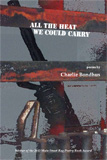December 25, 2013ALL THE HEAT WE COULD CARRY
Review by Cameron Conaway
Main Street Rag Publishing Company
P.O. Box 690100
Charlotte, NC 28227-7001
ISBN: 978-1-59948-436-5
2013, 72 pp., $14.00
www.mainstreetrag.com
Somewhere in the annals of this year’s history it will be written: West Point, the most prestigious military academy in the United States, hosted its first wedding between two men. And those service-members who, since November 10, 2004, were discharged and only given one-half separation pay under the “Don’t Ask, Don’t Tell” policy? Well, 2013 was the year a lawsuit victory granted them full separation pay. This was also the year that Main Street Rag, a small poetry publisher based in Charlotte, gave its annual award to a brave little book about the intricate intersections between war, masculinity and the relationship between two gay men.
Perhaps nowhere in All The Heat We Could Carry are these intersections more beautifully intertwined than in this stanza from the poem titled “Homecoming”:
We went to the bedroom
to tend to your body, starved
from fifteen months of hard living.
I smelled chemicals, felt shrapnel’s grit,
saw your burns.
You told me about the sliver
of metal lodged in your right calf,
bone deep, inextractable, that would not
affect your ability to walk or sit
but would always be there, much in the same
way there will always be war
someplace, impinging on our lives.
The stanza above exhibits the kind of unexpected economy of language that is found throughout the book. I say “unexpected” because the poems often read like prose, and too often in contemporary poetry the line breaks seem to be all/ that make a poem/ truly feel/ like a poem.
But notice the careful use of “tend.” The mind immediately leaps to tender and, in the context of this book, it works brilliantly because the lessons learned from gardening surface throughout the collection. On that same line, “starved” hangs ragged and alone and carries with it, for the briefest of moments, an understated sexual connotation before it runs into the next line. This is a master at work, and all the more masterful because as you’re reading the collection it’s unlikely that you’ll feel the writer’s sweat on the page. Many of the lines are so smooth that I didn’t notice the concise moments of dual meaning and tension until a few poems later. Wait, let me go back to that one, I’d think.
Then the poem ends with a word that made my eyes squint at the feeling of it all: “impinging.” Touched by the tenderness here, I immediately felt that word, saw the shrapnel caught between muscle, tendon and bone, felt the way war, in one way or another and regardless of where it’s taking place, impinges on all of us in one way or another.
Upon the second read I went there—that’s right, I called a friend and told him I’d just read experienced the best combat sports poem. The poem “At the Grappling Tournament” rocked me. Here are the first two stanzas:
When we first met, we were naked
in a tiled room, shower-damp,
everyone scoping everyone else
for a small fold of fat at the hip,
a not-quite healed bruise,
a wobbly ankle or
a weak tendon.
I knew you only because your friend
called you by name.As the bell sounded, we laced our limbs,
white light bleaching white skin, and your right hand
skipped across my back,
searching out the trick spot
where muscle and bone fail
while I knotted my arms about your shoulders,
in the soft violence of an embrace.
The locker rooms at grappling tournaments and mixed martial arts bouts are unlike the locker rooms of any other sport. There are naked athletes just the same, but for many competitors this is a chance to see your opponent’s weakness. Combat sports aren’t about first downs and fast breaks, they’re about incapacitating your opponent as quickly as possible so that you can move on unscathed. This poem captures all of that and more. A “wobbly ankle” or a “bruise” that indicates a “weak tendon” are serious matters. Fighters are notorious for putting tape on the uninjured ankle to serve as a distraction because they know everyone is “scoping everyone else.”
But the tenderness here, the limbs that are not tangled but “laced.” And the blossoming of love—the “So, how’d you meet?” story so often set in bars or restaurants or schools—is here told under the “white light” and on the blue mats and “in the soft violence of an embrace.”